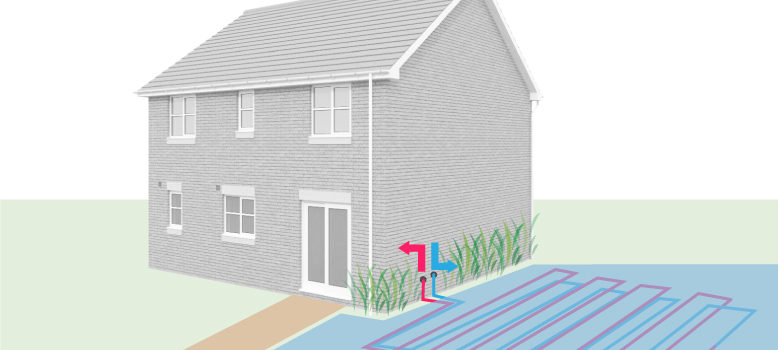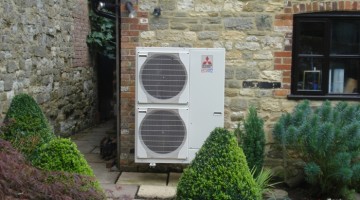
What are water source heat pumps?
Water source heat pumps work on a similar principle to both air source and ground source heat pumps. Instead of taking advantage of the heat in the air or the ground, they take advantage of the relatively consistent temperatures found in a body of water.
A series of flexible pipework is submerged in a body of water, such as a lake, river or stream. A heat pump pushes working fluid through the network of piping, and this fluid absorbs the heat from the surrounding water as it goes.
This working fluid is then compressed by an electric compressor, in a similar fashion to the other types of heat pump, which raises the temperature. A heat exchanger can then be used to remove the heat entirely from this working fluid, providing you with hot water that can be used for space heating (in radiators or under floor heating). It can even be plumbed into your hot water system, where a boiler can just provide the small amount of additional heat needed to bring it up to the required temperature, so it can be used for showers and baths.
Once the heat has been removed from the working fluid via the heat exchanger, it is once again pumped back through the pipework, thereby completing a continuous cycle.
The benefits of a water source heat pump
The heat transfer rate from water is higher from the ground, making them more effective than ground source heat pumps. In addition, if using a water source heat pump with a moving body of water, the heat is constantly being replaced, as new warmer water replaces the cooler water that has had its heat extracted by the working fluid.
For every 1kW of energy required to run a water source heat pump, 4-5kW of equivalent heat energy is produced which can be used to warm your home. This makes the technology more efficient than both air and ground source heat pumps.
The supply of hot water is also pretty much constant, despite being cooler in the winter; the body of water will still possess sufficient heat to enable the water source heat pump to operate in the winter. An issue only arises if the body of water completely freezes.
Unlike ground source heat pumps, where bore holes or trenches need to be dug on your plot for the piping, the pipework for a water source heat pump is relatively simple to install; it simply needs to be situated within a body of water, which should have little impact on your plot of land.
Benefits
- Installing a water source heat pump is relatively easy if there is a body of water available on your property.
- Water source heat pumps have a higher Coefficient of Performance than ground source and air source heat pumps: so for every unit of electricity used to operate them, they can produce more hot water.
- There is little visual impact on the property, since all the pipework in the water source heat pump system is submerged within the body of water.
Limitations
- A water source heat pump is reliant on there being a body of water at your property.
Cost
- Anywhere around £10k












Hi I found your article about water source heat pumps very interesting ,can you please advise where I can buy the components required.
Thanks Alan
Thank you for the informative article.
I am thinking of using a WSHP system utilisinig a pond within the site. However, there are newts living in the pond and I want to know if the WSHP has an effect on the temperature of the water body or if the net temperature impact on the pond will be negligible/neutral?
Would you know this information? Or could you signpost me to where I might find out?
Many thanks
Matthew
Great question Matthew. I really don’t have an answer for you. The water is going to become colder as the heat is being extracted from it, so I guess it could affect the newts. It is a known fact that GSHP’s installed in trenches rather than a borehole can affect the temperature of the soil and affect plantlife, so theoretically it could affect the pondlife with a WSHP.
The key thing is going to be the size of the pond relative to the heat pump I believe, so it is a conversation you will have to have with your installer.
I hope the newts do well!
We have a very small burn, a tributary really, running through our property. Could this be used to run a WSHP? Would that be better than a GSHP or ASHP?
I am looking, so far without success, for a company to supply and install a WATER source heat pump system. My post code in DE13 8NG. Are you able to help?
Hi there,
We currently reside in the North Pennines on a farm within several acres of our land. We reside at The Barns, Briar Dykes, Baldersdale DL129UU, Barnard Castle, and County Durham.
We intend to renovate our barns into a home and would like to install a minimum 8kw solar panels to the roof (We are South Facing), and we are looking at ground source heating combined with providing us with our own water supply. We do have free spring water which is shared and owned by a neighbouring farm, but there are some disruptions to the flow, which is why we would like our own supply.
We also have plans to include a small indoor heated swimming pool which are included in our plans and as such would like you to take this into consideration, as I am aware there are certain elements where you must liaise with these companies to ensure you provide adequate heat and water flow.
Our property has been designed as a Passive-Haus as such we welcome an opportunity to be supported with government funded projects or where we can make a saving. We are confident our barn conversion is subject to VAT saving conditions as set out by the HMRC.
Our property is located near to the Hury Reservoir and I can provide you with Architectural plans if required. We intend to submit the work out to tenure dependent upon what cost efficiency savings you can offer as we only have a small sensible budget.
If this is you – Then please get in touch on 01833 651859 for consultation.
Regards,
M.Perwaze
This is very interesting information, as my company through a Swiss partner seek to create our own water storage through our thermo cube flat pack thermal store tanks. Our 6 x 30 meter x 28mm helical coils will extract the thermal heat from our tanks heated from solar thermal heat pipe collectors in cold countries, or our PVT Thermaltricity panels in hot countries to excess the free solar PV power to power the heat pumps, while the by product in cooling the panels goes into the tanks.
We plan to also use this Hybrid for Hydroponics growing systems
I am just inquiring to find out if there are any feed in tariffs for Heat Pumps ?
HI, IS IT POSSIBLE TO USE THIS TO HEAT THE WATER AND THE HEATING SYSTEM ON A boat ? i have a small boat and obviously surrounded by water but also other boats, what Would the smallest footprint tha t would be effective and could i attach it to the bottom of the boat for it to be kept safely from being hit or damaged by other boats / FLOTSAM and jetsom (shopping trolleys and broken motorcycles!) thanks
Could a water source heat pump work in a well?
Interestingly the first thing to make sure is the replenishment rate of the well. Not all wells are built to bring up underground water, some were built as grey water systems catching roof run off to provide a store. This can be done with a simple pump, pump the well for say 4 hours and see how far it goes down and how quickly it is replenished back to the original level. If there is good replenishment then a well is fine as a heat source
Hi Clive, in theory yes if the water is continually being replenished. If the water in the well is stagnant then it will continue to get colder and colder and the water source heat pump will need to work harder to produce hot water – this means the heat pump will use more electricity, so will be more expensive to run.
Good morning
I’m researching alternative energy sources for a 200year old mill in the new forest area there is a mill pond adjacent to the mill that fills from the sea which has 2tides a day so wondering if water turbines or heat source if you could share your thoughts on either this would be very helpfull.
At the moment the heating is done with oil and want to try and change and go away as much as possible from fossil fuels also would like to lower the electricity costs.
I hope you can give us some advice hope to speak soon.
Yours truly
Ray mead
The two tides a day will replenish the thermal store that is your mill pond, maintaining hopefully a minimum temperature of at least 8C. Unfortunately most heat exchangers in heat pumps are not designed for saline water and hence would not be suitable. Normally titanium heat exchangers are used for salt/sea water – I am not aware of any MCS approved units with Titanium heat exchangers. An alternate would be to used a standard closed loop heat pump with an intermediate titanium heat exchanger, this would however increase the cost. However being in the New Forest the geology is good for your own bore hole to act as the heat source for something line a Soleco Grpund Source Heat Pump.
I am investigating the feasibility of extracting latent heat from a water source to provide heating to 2 existing adjacent properties currently heated by conventional heating systems.
property A with underfloor heating
property B with radiators.
The water source is approx 100m from the properties & 1.5m below GFL.
The maximum efficient output for a WSHP is 55C, so therefore works much better with low temperature emitters like underfloor heating. To make it work effectively you would need to oversize the radiators in property B. With regard to the Water Source, distance from the property only effects the length of the tranch. Water is quite a poor conductor of heat and hence using a pumps to circulate the water can move the heat with minimal detrimental effect. For a water source heat pump, inlet water should be a minimum of 8C. this normally means that if it is not moving water it needs to be deep to achieve this requirement.all year round.
Hi, we use water to cool solvent in our factory, when it comes out into our holding tanks it is 18c. Could we use a wshp to cool the water and provide us with hot water.
The simple answer is yes. Heatpumps like Soleco Open loop heat pumps are designed to take water at 13C but can work upto 18C and produce heating and hot water. The downside is that the hot water will not get to more than 55C. But will give a COP of 4. The key issue with an industrial process is the volume of tanks and flow involved to assess if the process is worthwhile. The design would entail heating water in a tank and using the tank to meet the hot water requirement.
The two tides a day will replenish the thermal store that is your mill pond, maintaining hopefully a minimum temperature of at least 8C. Unfortunately most heat exchangers in heat pumps are not designed for saline water and hence would not be suitable. Normally titanium heat exchangers are used for salt/sea water – I am not aware of any MCS approved units with Titanium heat exchangers. An alternate would be to used a standard closed loop heat pump with an intermediate titanium heat exchanger, this would however increase the cost. However being in the New Forest the geology is good for your own bore hole to act as the heat source for something line a Soleco Grpund Source Heat Pump.